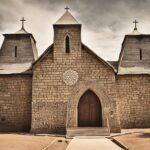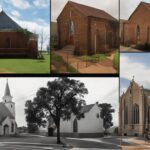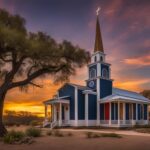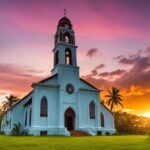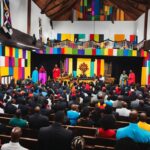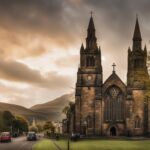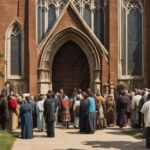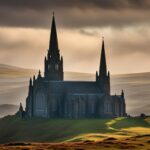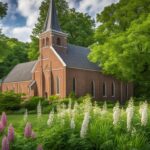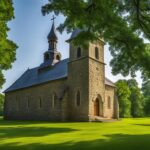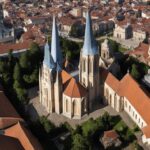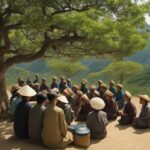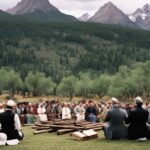The ZCC Church, also known as the Zion Christian Church, has a rich history that spans nearly a century. Its origins can be traced back to 1924 when Joseph Engenas Matlhakanye Lekganyane founded the church. Originally educated by Scottish Presbyterian missionaries, Lekganyane established the ZCC Church in Thabakgone before later relocating to Moria.
Since its inception, the ZCC Church has experienced remarkable growth, becoming the largest African independent church in the 1990s. Today, it boasts a membership of millions and has expanded beyond South Africa, reaching Zimbabwe, Botswana, and the Northern Cape.
Key Takeaways:
- The ZCC Church was founded in 1924 by Joseph Engenas Matlhakanye Lekganyane.
- It grew rapidly and became the largest African independent church in the 1990s.
- The church’s origins can be traced back to Thabakgone but later moved to Moria.
- Today, it has a significant presence in South Africa, Zimbabwe, Botswana, and the Northern Cape.
- Its founder, Joseph Lekganyane, played a vital role in shaping the church’s early history.
Key Beliefs and Doctrines of the ZCC Church
The ZCC Church, also known as the Zion Christian Church, holds a number of key beliefs and doctrines that shape its religious practices and teachings. These beliefs emphasize the healing power of religious faith and the central role of Jesus Christ in their worship services.
The ZCC Church views Jesus Christ as the universal Lord and gives him pre-eminence in their religious ceremonies. They believe in his ability to heal and provide spiritual guidance to his followers. While there have been debates about the extent to which Bishop Lekganyane replaces Jesus Christ as the Messiah in the faith of ZCC members, official ZCC literature does not give him messianic titles or divine status.
In addition to their Christian beliefs, the ZCC Church also respects and incorporates traditional African religious beliefs into their practices. They believe in the power of ancestors to intercede on behalf of humans and view ancestral spirits as an important part of their spiritual journey.
“The healing power of our faith lies in our belief in Jesus Christ as the universal Lord and Savior. We attribute our strength and guidance to him and seek his intercession in times of need.” – Bishop Barnabas Lekganyane
Key Beliefs and Doctrines:
- Belief in Jesus Christ as the universal Lord and Savior
- Emphasis on the healing power of faith
- Respect for traditional African religious beliefs and practices
- Belief in the intercession of ancestors
The ZCC Church’s key beliefs and doctrines play a significant role in shaping its worship practices and the spiritual experiences of its members. These beliefs have been passed down through generations and continue to guide the church’s teachings and rituals.
| Beliefs and Doctrines | Summary |
|---|---|
| Belief in Jesus Christ as the universal Lord and Savior | The ZCC Church believes in the pre-eminence of Jesus Christ and his ability to heal and provide spiritual guidance to his followers. |
| Emphasis on the healing power of faith | The ZCC Church strongly emphasizes the healing power of religious faith and attributes their strength and guidance to Jesus Christ. |
| Respect for traditional African religious beliefs and practices | The ZCC Church respects and incorporates traditional African religious beliefs, including the power of ancestors to intercede on behalf of humans. |
| Belief in the intercession of ancestors | The ZCC Church believes in the ability of ancestors to intercede on behalf of humans and considers them an integral part of their spiritual journey. |
ZCC Church: Historical Significance and Impact
The Zion Christian Church (ZCC) holds immense historical significance in South Africa and southern Africa as a whole. With an estimated membership of seven million people, it is the largest and fastest-growing African independent church in the region. Founded in 1924 by Joseph Engenas Matlhakanye Lekganyane, the ZCC Church has played a pivotal role in shaping African religious life.
The ZCC Church’s annual Easter celebration, held in Moria City, is a testament to its historical impact. This holy pilgrimage draws hundreds of thousands of members, showcasing the church’s influence and deep connection with its followers. The founder, Bishop Lekganyane, was renowned for his miracles, particularly his healing abilities, which further elevated the church’s prominence and cemented its place in African religious history.
Today, the ZCC Church continues to hold significant sway over its members and the broader religious landscape. Its teachings and practices have shaped the faith journeys of millions of individuals, emphasizing the healing power of religious faith and the intercession of ancestors. With its rapid growth, strong leadership, and impactful religious traditions, the ZCC Church remains a prominent institution in African religious and cultural life.
Tables and lists showcasing the church’s historical growth, the impact of its Easter celebration, and notable milestones in its history would provide valuable insights into the ZCC Church’s significance and influence. Additionally, incorporating quotes from church members and scholars would further illustrate the profound impact of the ZCC Church on communities and individuals.
Denominational Split or Schisms in the ZCC Church
The ZCC Church experienced a significant denominational split, leading to the formation of two separate branches. The split arose from a leadership struggle between the two sons of the church’s founder, Joseph Engenas Matlhakanye Lekganyane. Edward Lekganyane’s branch emerged as the largest and is now known as the Zion Christian Church.
This denominational split, often referred to as a schism, occurred due to differing interpretations of the church’s teachings and a quest for greater autonomy. Despite the division, both branches of the ZCC Church have continued to thrive and attract devoted followers.
While the exact details of the schism may vary depending on the sources, it is clear that the split did not significantly impact the growth and influence of the ZCC Church as a whole. Today, both branches continue to play important roles in African religious life, with their own distinct practices and leadership structures.
| ZCC Church Branch | Key Figures | Approximate Membership |
|---|---|---|
| Zion Christian Church (ZCC) | Bishop Edward Lekganyane | Millions |
| Other Branch | Dependent on the specific branch | Varies |
Leadership and Governance of the ZCC Church
The ZCC Church operates under a hierarchical leadership structure, with the Bishop serving as the highest authority. Currently, Bishop Barnabas Lekganyane holds this esteemed position and is highly revered by members of the church. As the spiritual and administrative head, the bishop is responsible for overseeing all aspects of the church’s operations, including the appointment of ministers and the implementation of church policies.
Within the ZCC Church, there is a deep respect for the authority and guidance of the bishop. His decisions and teachings are considered binding, and members look to him for spiritual direction. This strong leadership has played a vital role in the growth and stability of the church over the years.
The governance structure of the ZCC Church ensures that decisions are made collectively by a council of bishops and senior church officials. Known as the Moria Consultative Council, this body collaborates with the bishop to address important matters affecting the church. Together, they work towards maintaining the unity and cohesion of the ZCC Church.
| Leadership Structure of the ZCC Church |
|---|
| Bishop (Barnabas Lekganyane) |
| Moria Consultative Council |
The ZCC Church’s leadership and governance model ensure that the spiritual needs of its members are met and the church operates efficiently. The role of the bishop as a spiritual guide and the collaboration within the Moria Consultative Council contribute to the continued growth and influence of the ZCC Church.
Worship Practices of the ZCC Church
The worship practices of the ZCC Church are infused with vibrancy and devotion, reflecting the rich spiritual traditions of its members. Central to their religious calendar is the highly anticipated Easter celebration, which brings together thousands of church members in Moria City for several days of religious services. During these gatherings, singing and dancing take center stage, with multiple choirs showcasing their talents and leading the congregation in worship.
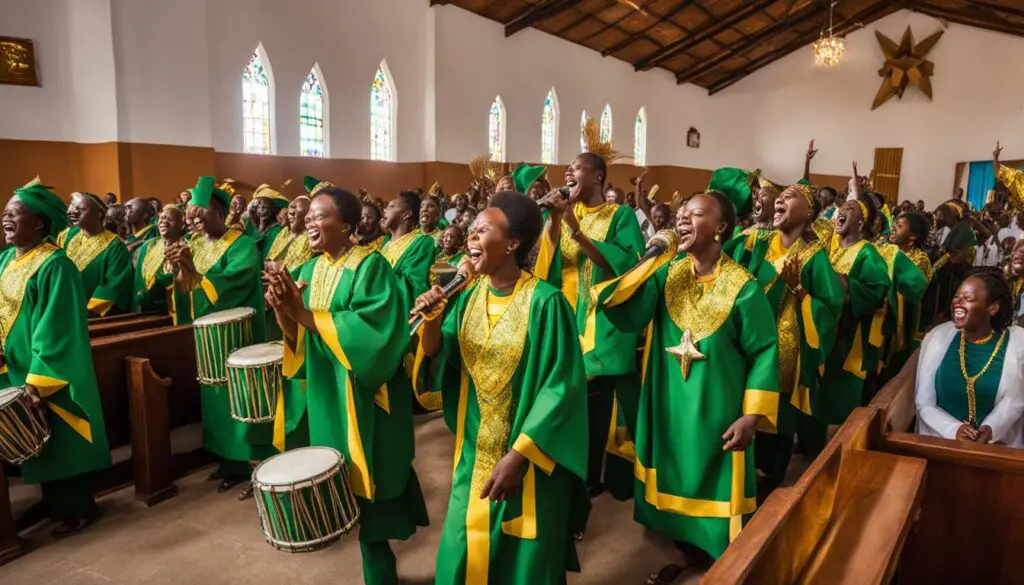
Another notable aspect of ZCC worship is the presence of prophets known as “mabone.” These spiritual guides walk among the worshipers, offering personal guidance and support, and serving as a bridge between the earthly realm and the divine. Their presence adds an element of mysticism and intimacy to the worship experience.
The ZCC Church places great emphasis on the power of prayer, fasting, and the reading of the Bible. These practices are seen as essential ways of connecting with God and seeking spiritual guidance. Moreover, the ZCC Church acknowledges the importance of traditional African religious beliefs, including the power of ancestors to intercede on behalf of humans. This recognition of ancestral spirituality allows the ZCC Church to cultivate a sense of continuity with their African heritage.
The worship practices of the ZCC Church reflect a deep commitment to faith, community, and cultural identity. Through their vibrant celebrations, heartfelt worship, and belief in the power of prayer, the ZCC Church creates a spiritual environment that nourishes its members and strengthens their connection with God.
Contemporary Influence of the ZCC Church
The ZCC Church continues to have a significant influence in South Africa and southern Africa. With an estimated membership of seven million, the ZCC Church is the largest church in the region. Its annual Easter celebrations draw widespread media attention and attract large crowds of members. The church’s founder, Joseph Engenas Matlhakanye Lekganyane, is considered a prominent figure in African religious history. The ZCC Church’s teachings and practices have shaped the faith journeys of its members and influenced the broader religious landscape in the region.
The ZCC Church remains a vital and active force in contemporary African society. Its emphasis on healing and spiritual power resonates with many individuals seeking faith-based solutions to their problems. The church’s teachings on the healing power of religious faith and the intercession of ancestors strike a chord with believers, offering an alternative perspective on healthcare and well-being.
Furthermore, the ZCC Church’s annual Easter celebration at Moria City highlights its continued impact and influence. This highly anticipated event showcases the unity, devotion, and spiritual fervor of the church’s members. The gathering of hundreds of thousands of faithful followers is a testament to the enduring relevance and significance of the ZCC Church in the lives of its members and the wider community.
Through its large and dedicated membership base, the ZCC Church contributes to the socio-cultural fabric of southern Africa. The church’s values and teachings provide a moral compass for its followers, promoting social cohesion, compassion, and community involvement. This influence extends beyond religious matters, shaping individual behavior, family dynamics, and community development initiatives.
ZCC Church’s Impact Today
The ZCC Church’s contemporary influence can be felt in various spheres of life. The church’s emphasis on faith healing has made it a significant player in the healthcare landscape, with many followers seeking spiritual remedies alongside or instead of conventional medical treatments. Additionally, the ZCC Church’s adherence to traditional African religious beliefs, such as ancestor veneration, contributes to the preservation of cultural heritage and identity.
The ZCC Church’s presence in the media, especially during its annual Easter celebrations, provides a platform for members to showcase their devotion and commitment to their faith. This visibility helps raise awareness about the church and its teachings, influencing public perceptions and understanding of African independent churches.
In summary, the ZCC Church’s contemporary influence is evident through its large membership, annual Easter celebrations, and impact on various aspects of society, including healthcare and cultural preservation. As the largest church in southern Africa, it continues to shape the religious, social, and cultural landscape of the region.
Current World Membership Number and Percentage of World Religions
The Zion Christian Church (ZCC) has a significant worldwide presence, with an estimated membership of seven million people. While precise data on the percentage of world religions is not available, the ZCC Church’s large membership and historical influence position it as a major religious body in the region.
Table: Comparison of World Religion Memberships
| Religion | Membership |
|---|---|
| Christianity | 2.3 billion |
| Islam | 1.9 billion |
| Hinduism | 1.2 billion |
| Buddhism | 520 million |
| Judaism | 14 million |
| Zion Christian Church (ZCC) | 7 million |
Based on the available data, the ZCC Church’s membership of seven million places it among the significant religious communities globally. While it may not have the same numbers as major world religions like Christianity or Islam, its influence in southern Africa and its rapid growth over the years solidify its position as a key player in the region’s religious landscape.
The ZCC Church’s teachings and practices, alongside its annual Easter celebration, attract widespread attention and draw large crowds of members. Its founder, Joseph Engenas Matlhakanye Lekganyane, is considered a prominent figure in African religious history. The ZCC Church’s continued growth and dedicated membership demonstrate its enduring impact in the present day.
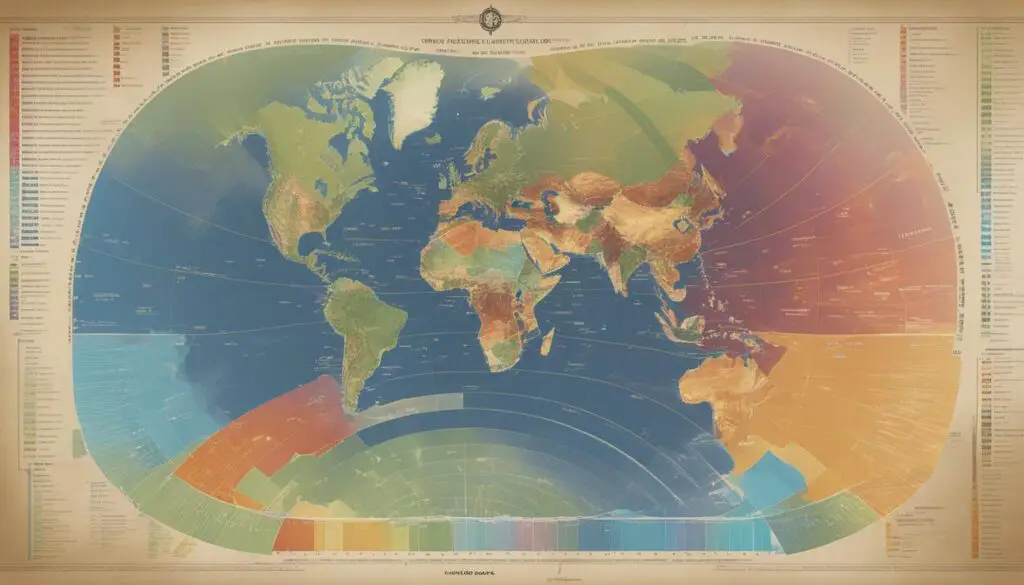
Challenges and Controversies Surrounding the ZCC Church
The ZCC Church, like any religious institution, has faced its share of challenges and controversies throughout its history. One ongoing debate revolves around the extent to which Bishop Lekganyane replaces Jesus Christ as the Messiah in the faith of ZCC members. While official ZCC literature does not attribute messianic titles or divine status to Bishop Lekganyane, critics have raised concerns about the veneration and emphasis placed on his role within the church.
Another area of contention relates to the financial practices and allegations of corruption within the ZCC Church’s leadership. Some critics have questioned the transparency and accountability of the church’s financial dealings, expressing concerns about the handling of funds and possible misuse of resources. It is important to note that these allegations remain disputed and have not been substantiated by concrete evidence.
Despite these challenges and controversies, the ZCC Church continues to thrive and demonstrate resilience in maintaining its dedicated membership base. The church’s teachings and practices, which emphasize faith, healing, and the power of prayer, have resonated with millions of followers. The ZCC Church remains a significant religious institution in southern Africa, with a rich history and a lasting impact on the region’s religious landscape.
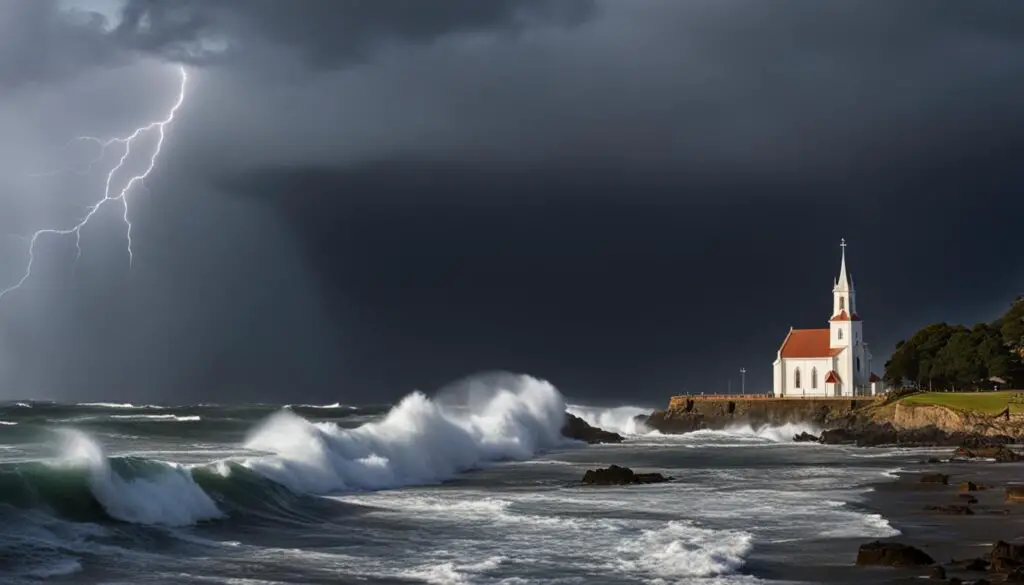
Overall, it is crucial to approach discussions about the challenges and controversies surrounding the ZCC Church with an open and balanced perspective. While criticisms and debates exist, they should not overshadow the church’s positive contributions and the spiritual experiences of its members. The ZCC Church’s ability to navigate these challenges and maintain its influence testifies to the strength and endurance of its faith community.
Conclusion
In conclusion, the ZCC Church has a rich history and significant influence in southern Africa. Established in 1924 by Joseph Engenas Matlhakanye Lekganyane, the church has grown to become the largest and fastest-growing African independent church in the region. With a membership of seven million people, the ZCC Church is a prominent institution in African religious life.
The ZCC Church holds beliefs that emphasize the healing power of religious faith and views Jesus Christ as the universal Lord. While there have been debates about the extent of the founder’s role in the faith of ZCC members, the church’s official literature does not give him messianic titles or divine status. The ZCC Church also respects traditional African religious beliefs, incorporating the power of ancestors into their faith practices.
The ZCC Church’s historical significance is evident in its rapid growth, annual Easter celebrations, and the renowned miracles performed by its founder. Despite a denominational split resulting from a leadership struggle, the church continued to thrive under different leadership and maintain its influence. Today, the ZCC Church is led by Bishop Barnabas Lekganyane and follows a hierarchical governance structure.
Worship in the ZCC Church is characterized by singing, dancing, and the participation of prophets known as “mabone.” The highlight of the religious calendar is the Easter celebration, which draws a large number of church members for several days of worship at Zion City. The ZCC Church also emphasizes the power of prayer, fasting, and the reading of the Bible.
With its large membership and historical and contemporary influence, the ZCC Church plays a significant role in the religious landscape of southern Africa. Despite challenges and controversies, the church continues to thrive, shaping the faith journeys of its members and impacting the broader community.
FAQ
What is the ZCC Church?
The ZCC Church, also known as the Zion Christian Church, is the largest and fastest-growing African independent church in the 1990s.
Who founded the ZCC Church?
The ZCC Church was founded in 1924 by Joseph Engenas Matlhakanye Lekganyane.
What are the key beliefs of the ZCC Church?
The ZCC Church believes in the healing power of religious faith and views Jesus Christ as the universal Lord.
How many members does the ZCC Church have?
The ZCC Church has an estimated membership of seven million people.
What is the significance of the ZCC Church?
The ZCC Church has had a significant historical impact in South Africa and southern Africa as a whole.
Did the ZCC Church experience a denominational split?
Yes, the ZCC Church experienced a denominational split following a leadership struggle between the sons of the founder.
Who is the current leader of the ZCC Church?
The current leader of the ZCC Church is Bishop Barnabas Lekganyane.
What are the worship practices of the ZCC Church?
Worship in the ZCC Church includes singing, dancing, prayer, fasting, and the reading of the Bible.
What is the contemporary influence of the ZCC Church?
The ZCC Church continues to have a significant influence in South Africa and southern Africa.
How many members does the ZCC Church have worldwide?
The exact number of worldwide members is not available, but the ZCC Church is the largest church in southern Africa.
What challenges and controversies has the ZCC Church faced?
The ZCC Church has faced questions about the role of its leaders and allegations of financial impropriety.

